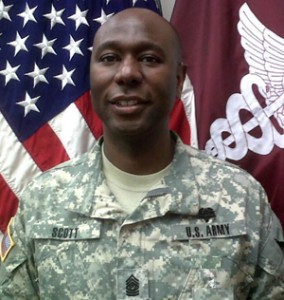By LTC (P) Hugh Bair, WTC G-3,5,7 Chief

LTC (P) Hugh Bair announces the launch of a new online resource for Families of wounded, ill, and injured Soldiers.
Over the Fourth of July holiday, I had the opportunity to spend time with my Family at a North Carolina beach. It was great to kick back with my dad and brother and get caught up. As they are both now Veterans, there was much focus on and interest in my new job supporting the Army’s wounded, ill, and injured Soldiers and their Families.
Throughout my career, I have had the privilege of serving with Soldiers at the tip of the spear. My Family during those missions was often far away back home figuring things out without me. Well, that might be OK for normal circumstances, but I know when things aren’t going well, like when your loved one gets injured in a training accident, diagnosed with a deadly disease, or wounded in a firefight, you should not be figuring things out on your own. You need help.
To that end, the Army worked hard to create a comprehensive support system for our Soldiers Families and loved ones. For our wounded warriors, focusing on the mission at hand—to heal and transition, is clear. Medical appointments, visits with a squad leader, rehabilitation, adaptive sports, career planning. For the Family members however it’s often hard to figure out the Army system, learn the acronyms, or understand their role in the recovery process.
So, it’s my pleasure to launch a new online learning tool exclusively for those who are caring for our wounded, ill, and injured Soldiers. The Warrior Transition Command’s new Comprehensive Transition Plan Learning Module for Families walks loved ones through the structure of the Warrior Transition Unit, outlines their role in the seven-stages of the Comprehensive Transition Plan (CTP), includes four videos, and provides links to additional resources.
We’ve made this tool accessible online so that a Soldier’s immediate caregiver and extended Family around the world can better understand what they are going through and how to help. As a multi-generational military Family, I know the value of having my loved ones near and supportive of my career goals. The more they know, the more I can focus on the job at hand.
I look forward to hearing from our wounded warrior’s Family members about this new tool through the blog comments feature. Is it helpful? What needs to be added? How can we make it better? I know my own Family is watching to see what we do for our wounded, ill, and injured, and are ready to hold me accountable at our next Family vacation. I want to do them, but more importantly, our wounded warriors, proud.




